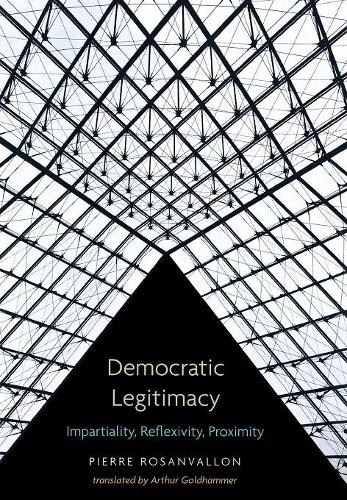
Democratic Legitimacy: Impartiality, Reflexivity, Proximity
(Hardback)
Publishing Details
Democratic Legitimacy: Impartiality, Reflexivity, Proximity
By (Author) Pierre Rosanvallon
Translated by Arthur Goldhammer
Princeton University Press
Princeton University Press
4th October 2011
United States
Classifications
Tertiary Education
Non Fiction
Political science and theory
321.8
Physical Properties
Hardback
248
Width 152mm, Height 235mm
510g
Description
It's a commonplace that citizens in Western democracies are disaffected with their political leaders and traditional democratic institutions. But in Democratic Legitimacy, Pierre Rosanvallon, one of today's leading political thinkers, argues that this crisis of confidence is partly a crisis of understanding. He makes the case that the sources of democratic legitimacy have shifted and multiplied over the past thirty years and that we need to comprehend and make better use of these new sources of legitimacy in order to strengthen our political self-belief and commitment to democracy. Drawing on examples from France and the United States, Rosanvallon notes that there has been a major expansion of independent commissions, NGOs, regulatory authorities, and watchdogs in recent decades. At the same time, constitutional courts have become more willing and able to challenge legislatures. These institutional developments, which serve the democratic values of impartiality and reflexivity, have been accompanied by a new attentiveness to what Rosanvallon calls the value of proximity, as governing structures have sought to find new spaces for minorities, the particular, and the local. To improve our democracies, we need to use these new sources of legitimacy more effectively and we need to incorporate them into our accounts of democratic government. An original contribution to the vigorous international debate about democratic authority and legitimacy, this promises to be one of Rosanvallon's most important books.
Reviews
"This book is an illuminating analysis of the transformed problem of political legitimacy that exists in contemporary democracy. It should be read by anyone seriously interested in thinking through the dangers posed by the climate of political distrust that has become normal in democratic regimes... Rosanvallon here undertakes a comprehensive, in-depth investigation of the problem of legitimacy. He provides a new framework and new vocabulary for analyzing the problem and hence proposing a way forward."--Choice "[T]his excellent book should stimulate the reflection of those who seek to better understand the evolution of democracy and its justifications... Rosanvallon's quest for the sources of democratic legitimacy in an uncertain age opens up a fascinating dialogue between the past and present, highlighting how three key countries have struggled with concerns for liberty and the democratic idea."--Survival "[T]he book's main attraction: sharp, self-contained historical accounts of specific issues and ideas, where Rosanvallon's thinking is clearly at its best."--Paulina Ochoa Espejo, European Political Science
Author Bio
Pierre Rosanvallon is professor at the College de France and the Ecole des Hautes Etudes en Sciences Sociales in Paris. His many books include "Counter- Democracy, The Demands of Liberty, Democracy Past and Future", and "The New Social Question" (Princeton).
